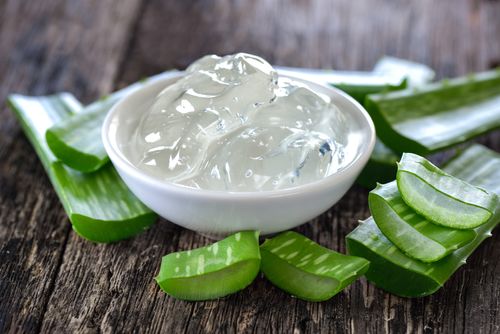Aloe Vera: Nutritional Facts, Benefits, Weight Loss, and Side Effects
Today, aloe vera is primarily known to treat sunburn, but did you know that the gel inside of the aloe vera plant can be used for different health ailments? Aloe vera gel can be used directly from the plant, it can be consumed in the form of a juice, or it can be applied topically to the skin.
Table of Contents
What Is Aloe Vera?
Aloe vera, most commonly known as Aloe barbadensis is a succulent native to tropical regions, and has been used as a medicinal plant for centuries. It thrives in a dry climate and has become a popular household plant because of its low maintenance and care.
Aloe vera gel is the clear, thick, gooey substance that can be harvested from the aloe plant when the leaves are cut. The gel can then be used topically over burns or as a moisturizer. It can also be blended into smoothies or mixed into juices or elixirs for digestion and other internal health benefits.
Nutritional Value Of Aloe Vera
Aloe vera is a very potent, medicinal plant. It has a whole array of uses for health and wellness and it’s all because of its extensive nutritional profile.
Vitamins and Minerals
Vitamin C is essential for processes such as the formation of iron, immune system support, and maintenance of bones and teeth. Aloe vera contains a good amount of vitamin C (9.1 g for every 1 cup of aloe vera juice).
Aloe vera also contains essential vitamins like vitamin A (beta carotene), vitamin E, vitamin B12, folic acid (vitamin B) and choline. The plant also contains minerals, calcium, chromium, copper, selenium, magnesium, manganese, potassium, sodium, and zinc.
Enzymes
The plant is considered to be unique as it contains a number of beneficial enzymes that help break down sugars and fats. These enzymes, among others, include aliiase, amylase and lipase, which are vital enzymes in the digestion of starches and fats.
Fatty acids
Aloe vera gel contains fatty acids from the steroid group – cholesterol, campesterol, β-sitosterol and lupeol. These fatty acids are responsible for the anti-inflammatory, antiseptic and analgesic properties of this supplement. Aloe vera gel is a very therapeutic plant with an array of unique properties that can alleviate, treat and even cure many health issues and ailments. Given below are a few more benefits that the plant provides us with –
Benefits of Aloe Vera
Aloe vera is extremely hydrating and contains important vitamins and minerals, enzymes and fatty acids for optimal body function. Here are important benefits of using aloe vera:
1. Treating Constipation

Constipation is not only uncomfortable, but it can have adverse effects on intestinal and digestive health. Aloe vera gel can be used as a natural laxative and help move bulk along the digestive tract.
The latex or the part of the plant in between the skin and gel contains anthraquinones, which is a compound that is responsible for the laxative effect. If you are taking aloe vera gel for constipation, be sure to start with a small amount (8 oz or around 200ml juice) in order to allow your system to get used to the laxative effects.
2. Staying Hydrated
Hydration is very important for overall health. Aloe vera juice is a great alternative to sugary drinks and fruit juices that can negatively affect your health. Aloe vera juice is low in sugar and calories and can thus be consumed directly or mixed with other juices and smoothies.
3. Blood Sugar Regulation

Aloe vera has been proven to have “some” beneficial effects in improving conditions such as prediabetes and diabets type 2. A study has shown that when subjects ingested aloe vera in liquid and powder form, it helped improve the regulation of blood sugar levels.
4. Prevents Stomach Ulcers
One of the biggest therapeutic benefits of aloe vera is through the treatment of digestive ailments. Stomach ulcers are painful sores in the stomach lining. They are usually easily healed, but can become severe if left untreated. Aloe vera gel is an anti-inflammatory substance which means it’s especially beneficial in treating internal lesions such as ulcers. It has been proven that aloe vera gel, if consumed on a regular basis, helps to heal the lining of the stomach and to reduce stomach ulcers.
5. Reduces Dental Plaque
Preventing plaque build up is key to preventing cavities and dental issues like gingivitis and abscessed teeth.Streptococcus mutans and Candidas albicans are the main cause of plaque in the mouth. The antibacterial compounds in aloe vera target these two strains of bacteria and yeast. In a study, Aloe vera juice was been compared to a standard ingredient in medical grade mouthwash, chlorhexidine. In fact, aloe juice was proven to be just as effective as mouthwash in reducing plaque.
6. Improves Skin Health

7. Helps Treat Canker Sores
Canker sore or mouth ulcers are small, often painful bumps that can form under your lip or at the base of the gums. The antibacterial effect of aloe vera can effectively reduce the size of mouth ulcers. A study showed that aloe vera was proven to be a better treatment than over-the-counter corticosteroids.
8. Relieves Acid Reflux
Acid reflux can arise when stomach acid flows back up the esophagus. Acid reflux symptoms include a burning sensation in the chest, bloating, nausea and cough. Aloe vera juice is known to have a soothing effect for those with acid reflux symptoms.
Moreover, the bad bacteria in the gut (H. pylori, candida and SIBO) can produce gas that can cause bloating and discomfort in the abdomen. This bad bacteria also can also cause the opening of the esophagus to weaken and acid to rise. The antibacterial properties of aloe vera kills the bacteria associated with acid reflux and improves digestion so the system can come back into balance.
Forms of Aloe Vera
The aloe vera leaf comprises three parts: the skin, the latex and the gel. The latex is a thin layer of yellow gel between the skin and gel of the aloe leaf. The latex contains the compounds that are responsible for laxative effects. Aloe Vera is harvested from the inner fillet of an aloe vera plant. Many people harvest their own aloe vera and use the gel, mix into water, juice it or blend into smoothies. The skin is completely edible and many people include it in salads or as a vegetable to dip into hummus. The gel is edible as well and contains the most therapeutic benefits. When filleting the aloe gel, you want to avoid the latex as consuming too much of it can cause serious side effects.
Here are some different forms you can consume aloe vera in:
1. Juice

Aloe vera juice is sold in most health food stores. Be sure to choose juice that is all natural and organic and does not contain sugar or other preservatives.
2. Softgels
Aloe vera softgels are also available at most health food stores. This is a good option if you are a busy individual and want something easy and on the go. Be sure to choose a natural, organic brand.
3. Gel

Aloe vera gel for consumption, is sold in store in the form of aloe vera leaves. You can buy them in most natural grocery stores. Simply cut the leaf, split open and scoop out the gel filet, avoiding the latex part.
Side Effects of Aloe Vera
Even though aloe vera is considered safe enough for consumption, it’s not 100% safe for these reasons:
- Long term consumption of the latex of aloe vera has been known to cause effects such as gastrointestinal discomfort, kidney issues, muscle weakness and arrhythmia.
- Consuming aloe vera gel containing latex while pregnant is not safe and if consumed over a long period, can be fatal.
- Those with IBS, or other digestive disorders should exercise caution when consuming aloe vera gel with latex as it could worsen the condition.
- The aloe vera gel itself may not be safe for those taking certain prescription medication and may cause interactions.
- Do not eat aloe vera topical gel as it contains other substances that can be toxic.
- In general, aloe vera gel, without latex is safe to eat. If you are unsure whether or not you can consume aloe vera gel, consult your doctor.
Aloe Vera and Weight Loss

An unhealthy gut is not helpful for those who want to lose weight. Aloe vera can be used as a digestive aid to assist in healthy digestion, metabolism, and excretion. The laxative properties of aloe vera ensures thorough digestion and reduces water retention. Aloe vera can help with both metabolic processes. The B-vitamins and enzymes in aloe vera make it excellent at burning fat. When actively losing weight, your body naturally goes into detox mode. Aloe vera contains a complex carbohydrate called acemannan which helps in the detoxiftiong process. That, combined with its laxative properties, is a great reason to consume aloe vera juice while detoxing.
Summary
Whether you apply it topically or consume it via juice, softgels or the gel itself, aloe vera has a unique profile of nutritional benefits that can treat various health issues. Aloe vera contains enzymes and fatty acids that help with the metabolic and digestive processes in the body. The plant is especially effective for relieving constipation and any digestive upsets.
Aloe vera can also be used to support weight loss through its detoxifying, laxative and metabolic effects. It is considered safe to eat, however, when making your own gel from the aloe leaves, you should be caution to not consume too much of the latex (the part in between the gel and the skin). The skin can be eaten and the gel can be blended into a smoothie, mixed into water or juice or eaten as is.youxfit.blogspot.com




